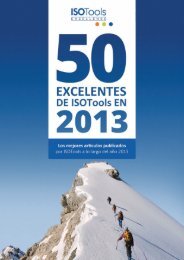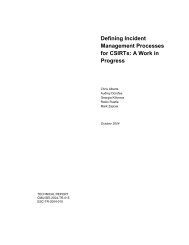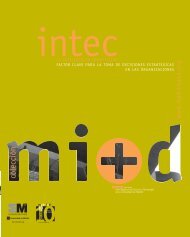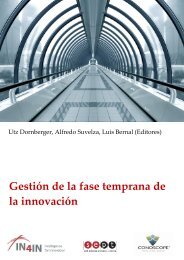The Global Innovation Index 2012
The Global Innovation Index 2012
The Global Innovation Index 2012
You also want an ePaper? Increase the reach of your titles
YUMPU automatically turns print PDFs into web optimized ePapers that Google loves.
Box 1: Strengthening the innovation environment in the United Arab Emirates<br />
(continued)<br />
<strong>The</strong> UAE can provide monetary incentives<br />
for undertaking research, hiring<br />
research personnel, and introducing<br />
environmentally friendly technologies—approaches<br />
taken in Singapore.<br />
• Protective Regulations: Investor protection<br />
in the UAE must be enhanced if<br />
it is to become comparable to that of<br />
leading economies such as Singapore<br />
and Norway. <strong>The</strong> legal and regulatory<br />
systems in Singapore and Norway<br />
offer more protective measures. <strong>The</strong>se<br />
include active bankruptcy laws, disclosure<br />
of information on transactions,<br />
and the liability of directors for damages<br />
caused. Shareholders can also<br />
launch lawsuits more easily.<br />
Operations support<br />
<strong>The</strong> UAE has operations support for innovation.<br />
<strong>The</strong> Technology Development<br />
Committee (TDC) plays a notable role in<br />
setting policy in Abu Dhabi. Similarly, the<br />
Khalifa Fund for Enterprise Development<br />
in Abu Dhabi provides funding for support<br />
systems—such as training and development—for<br />
entrepreneurs, and invests in<br />
specific projects. Overall, however, there<br />
is limited support for companies active in<br />
R&D and innovation. <strong>The</strong> UAE can expand<br />
assistance in three areas.<br />
1. <strong>The</strong> UAE would benefit from a dedicated<br />
agency that provides support<br />
services specifically for innovators.<br />
Such services typically would include<br />
R&D funding, advisory support, matchmaking,<br />
and networking, as well as<br />
logistical support including marketing<br />
and promotion.<br />
2. <strong>The</strong> UAE should increase the number<br />
of its incubators. <strong>The</strong> government<br />
can play a role in establishing and<br />
nurturing such incubators. In addition,<br />
entities such as CERT Technology Park<br />
in Abu Dhabi can provide mentoring<br />
and guidance to access the UAE market.<br />
<strong>The</strong>y can help support innovative<br />
companies by transforming original<br />
ideas into economic value.<br />
3. <strong>The</strong>re should be a greater focus<br />
on innovation. A number of different<br />
entities, such as the Chamber<br />
of Commerce, offer support services<br />
such as matchmaking and networking<br />
for businesses. <strong>The</strong>se efforts<br />
would be more powerful if they were<br />
coordinated with a specific focus on<br />
innovators.<br />
Orchestration<br />
In the UAE, orchestration can exist among<br />
most traditional and nascent sectors targeted<br />
for innovation. Having an entity<br />
charged with ensuring the orchestration<br />
of all these activities is critical for policies<br />
and initiatives to succeed. Orchestration<br />
involves coordinating the implementation<br />
of policies at the operational level, such<br />
as ensuring that funding is channelled<br />
to high-potential businesses and helping<br />
these businesses find investors and customers.<br />
Orchestration also means working<br />
with stakeholders in the landscape to<br />
identify and advocate new policies or policy<br />
revisions that will provide further support.<br />
<strong>The</strong> back-and-forth of orchestration<br />
provides continuous feedback that can<br />
improve policies.<br />
<strong>The</strong> challenge in the UAE is that crossstakeholder<br />
interaction is limited. It occurs<br />
typically through bilateral exchanges.<br />
Hence, the creation of an orchestration<br />
entity will produce engaged stakeholders<br />
connected precisely through the coherent<br />
linkages that result in a thriving ecosystem.<br />
positioning their countries for competitive<br />
advantages as they develop<br />
their innovation strategies. For<br />
example, between 1978 and 1997,<br />
Singapore focused on the development<br />
of clusters in high value-added<br />
and mutually supporting industries<br />
such as electronics, petrochemicals,<br />
and engineering. <strong>The</strong> country<br />
thereby gained expertise and a<br />
competitive edge in electronics and<br />
high-tech products and services.<br />
Linking innovation stakeholders<br />
GCC countries have improved their<br />
stakeholder collaboration, according<br />
to the Executive Opinion Survey<br />
of the World Economic Forum in<br />
2010-11 (see Figure 3). Saudi Arabia,<br />
for example, has risen from a ranking<br />
of 49 out of 130 countries in 2007<br />
to 28 out of 142 in 2011 in terms of<br />
university-industry research collaboration.<br />
This is clear evidence of the<br />
strong initial impact of promotion<br />
entities such as the King Abdulaziz<br />
City for Science and Technology.<br />
<strong>The</strong>se entities are strengthening and<br />
promoting effective links among<br />
stakeholders in the ecosystem. Such<br />
links may have resulted in positive<br />
outcomes, such as the increase in the<br />
number of research publications.<br />
<strong>The</strong>se impressive first steps<br />
should not lead to complacency.<br />
<strong>The</strong> main stakeholders in the innovation<br />
landscape in the GCC—<br />
such as government agencies, business,<br />
and academia—remain insufficiently<br />
connected. <strong>The</strong>y have yet<br />
to coordinate in a fully effective<br />
and creative manner. Coordination<br />
among stakeholders often is limited<br />
to bilateral exchanges with little<br />
alignment among the innovation<br />
entities. For example, small, nascent<br />
enterprises remain isolated from the<br />
formal economy. In addition, many<br />
multinational corporations, such as<br />
those in the energy sector, are at<br />
115<br />
THE GLOBAL INNOVATION INDEX <strong>2012</strong> 5: <strong>The</strong> Role of Coherent Linkages






